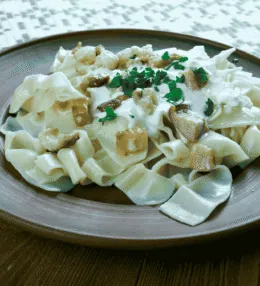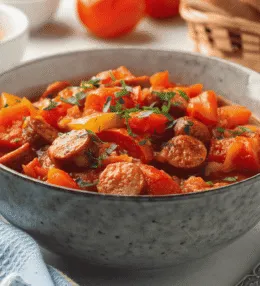
- View
Table of Contents
ToggleButter tarts sit at the centre of Canadian baking, a small pastry with a generous heart. A flaky shell holds a glossy filling that tastes of butter and caramel. From roadside bakeries to local festivals, this little tart inspires loyalty and cheerful debate.
Crisp pastry meets a syrupy centre that wants to escape the first bite. Some prefer them warm so the filling flows, others like a gentle set for tidy edges. Either way, a napkin is wise, and a mug of tea turns a quick nibble into a quiet pleasure.
They belong to weekends at the cottage, post-game treats, and prairie kitchen tables. Friends compare favourite stops and swap boxes on long drives. The tart travels well, keeps spirits up, and brings a wink of nostalgia without asking for attention.
Butter tarts move easily from a church bake sale to a smart patisserie counter. Some arrive in rustic tins with crimped edges, others gleam in neat fluted shells. Whichever you choose, the pleasure is immediate, and the memory tends to linger.
Want to dive deeper into Canadian Cuisine? Don’t miss our post on Traditional Canadian Foods to Try
What Is a Butter Tart?
A butter tart is an individual shortcrust pastry filled with a mixture of butter, brown sugar, eggs, and syrup. The cases are baked until the rims caramelise and the centre bubbles softly. Once cooled, the top wrinkles slightly while the middle stays tender.
Bakers play with add ins such as raisins, currants, pecans, or a little maple. Some blind bake the cases, others chill the dough and fill it raw. The pastry can be thin and crisp or thicker and flaky, yet the idea remains friendly and recognisable.
They fit many moments. Serve one after supper, tuck another into a lunch box, or plate two with vanilla ice cream for a cafe style dessert. The tart is handy for picnics, fairs, and holiday trays, and it never needs fancy cutlery to shine.
Ingredients and Taste
Butter, brown sugar, eggs, and syrup form the filling, lifted by vanilla and a pinch of salt. The pastry is flour and fat with a touch of cold water, sometimes lard for extra flake. Nothing fussy, just pantry staples.
The first bite gives a fine crackle from the pastry, then a warm rush of buttery caramel. Salt keeps the sweetness lively. Raisins bring a gentle chew, pecans add toast, and a maple version carries a woodsy aroma. The dark edges add a pleasant hint of bitter.
Bakers talk about runny versus firm. Runny means a centre that flows like soft caramel and licks the plate. Firm means a clean cut and tidy fingers. Both have charm. Strong tea or black coffee suits the richness, and the tarts keep well for a day or two.
A Taste of History
Early recipes turned up in Ontario during the early twentieth century, often tucked into community cookbooks. Influences likely came from British treacle tarts and Quebec sugar pies, then adapted by settlers who relied on simple ingredients through long winters.
Church bazaars and fall fairs helped the tart find its audience. Small pans made neat portions, and home bakers used what they had, from corn syrup to golden syrup. Lard pastry was common, and the style evolved through households rather than formal bakeries.
Now there are butter tart trails and lively festivals where bakers guard family formulas. Some add sea salt, whisky, or seasonal fruit, yet the essential idea holds steady. A crisp shell, a glowing centre, and a taste that feels like a friendly hello.
How to Make Butter Tarts
Butter Tarts are a classic Canadian pastry with flaky shells filled with a sweet, buttery custard that can be gooey or firm depending on preference. The filling balances richness with a subtle caramelised flavour. A little patience with chilling and careful baking ensures crisp pastry and a luscious filling. See the recipe card at the bottom for printable directions
Ingredients
For the pastry
- 200g plain flour
- 120g unsalted butter, chilled and cubed
- 1 tbsp granulated sugar
- 1/4 tsp salt
- 60ml ice-cold water
For the filling
- 80g unsalted butter, softened
- 120g brown sugar
- 80ml maple syrup (or golden syrup)
- 1 large egg
- 1 tsp vanilla extract
- 1/4 tsp salt
- 50g raisins or chopped pecans (optional but traditional)
Cooking Instructions
Step 1: Prepare the pastry
To begin, sift the flour, sugar, and salt into a bowl. Rub in the chilled butter with fingertips until the mixture resembles coarse crumbs. Gradually add ice water, mixing just until the dough comes together. Transition to chilling.
Step 2: Chill the pastry
Form the dough into a disc, wrap in cling film, and refrigerate for at least 30 minutes. Chilling relaxes the gluten and firms the butter for flakier pastry. Move to preparing the filling.
Step 3: Preheat the oven
Set the oven to 190°C (375°F). Grease a muffin tin lightly with butter. Transition to making the filling.
Step 4: Mix the filling
In a bowl, cream the softened butter and brown sugar until smooth. Add the egg, maple syrup, vanilla, and salt, whisking until fully blended. Stir in raisins or pecans if using. Move to shaping the pastry shells.
Step 5: Roll out the pastry
On a floured surface, roll the chilled dough to 3mm thickness. Cut circles large enough to fit the muffin tin. Line each cup with pastry rounds, pressing gently into shape. Transition to filling.
Step 6: Fill the shells
Spoon the filling into the pastry shells, filling each about two-thirds full. Do not overfill, as the mixture bubbles during baking. Move to baking stage.
Step 7: Bake the tarts
Place the tin in the oven and bake for 20–25 minutes until the pastry is golden and the filling is set but still slightly wobbly in the centre. Proceed to cooling.
Step 8: Cool before serving
Allow the tarts to cool in the tin for 10 minutes before removing. This prevents breakage and lets the filling firm up. Transfer to a wire rack.
Final Step: Serve and enjoy
Serve Butter Tarts warm or at room temperature. They pair beautifully with tea or coffee. Presentation tip: sprinkle with a light dusting of icing sugar for an elegant finish.
Variations and substitutions
- Substitute maple syrup with golden syrup or honey if maple is unavailable.
- For nut-free tarts, omit pecans and use raisins only.
- Add a touch of lemon zest to the filling for a lighter flavour.
- For a gooier filling, reduce baking time by 2–3 minutes.
Cooking Tips for Perfect Butter Tarts
- Keep butter very cold when making pastry to achieve flakiness.
- Avoid overworking dough to prevent tough pastry.
- For uniform tarts, use the same amount of filling in each shell.
- Cool slightly before removing from the tin to avoid cracking.

Canadian Butter Tarts
Ingredients
For the pastry
- 200 g plain flour
- 120 g unsalted butter chilled and cubed
- 1 tbsp granulated sugar
- 1/4 tsp salt
- 60 ml ice-cold water
For the filling
- 80 g unsalted butter softened
- 120 g brown sugar
- 80 ml maple syrup or golden syrup
- 1 large egg
- 1 tsp vanilla extract
- 1/4 tsp salt
- 50 g raisins or chopped pecans optional but traditional
Instructions
- To begin, sift the flour, sugar, and salt into a bowl. Rub in the chilled butter with fingertips until the mixture resembles coarse crumbs. Gradually add ice water, mixing just until the dough comes together. Transition to chilling.
- Form the dough into a disc, wrap in cling film, and refrigerate for at least 30 minutes. Chilling relaxes the gluten and firms the butter for flakier pastry. Move to preparing the filling.
- Set the oven to 190°C (375°F). Grease a muffin tin lightly with butter. Transition to making the filling.
- In a bowl, cream the softened butter and brown sugar until smooth. Add the egg, maple syrup, vanilla, and salt, whisking until fully blended. Stir in raisins or pecans if using. Move to shaping the pastry shells.
- On a floured surface, roll the chilled dough to 3mm thickness. Cut circles large enough to fit the muffin tin. Line each cup with pastry rounds, pressing gently into shape. Transition to filling.
- Spoon the filling into the pastry shells, filling each about two-thirds full. Do not overfill, as the mixture bubbles during baking. Move to baking stage.
- Place the tin in the oven and bake for 20–25 minutes until the pastry is golden and the filling is set but still slightly wobbly in the centre. Proceed to cooling.
- Allow the tarts to cool in the tin for 10 minutes before removing. This prevents breakage and lets the filling firm up. Transfer to a wire rack.
- Serve Butter Tarts warm or at room temperature. They pair beautifully with tea or coffee. Presentation tip: sprinkle with a light dusting of icing sugar for an elegant finish.
Nutrition
You May Also Like











Leave a Review